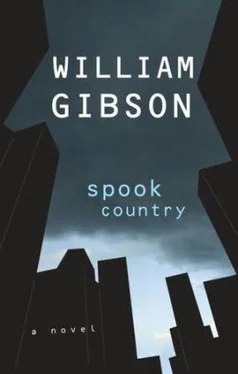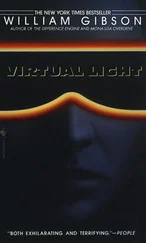His own room had a sink and toilet, a hotplate, a mattress, his computer, amp, speakers, keyboards, the Sony television, an iron, an ironing board. His clothing hung on an ancient wheeled iron rack, rescued from the sidewalk on Crosby Street. Beside one of his speakers stood a small blue vase from a Chinese department store on Canal, a fragile thing he had secretly dedicated to the goddess Ochun, she whom Cuban Catholics knew as Our Lady of Charity, at Cobre.
He cabled his Casio keyboard, added warmer water to the rinsing socks, pulled a long-legged folding director’s chair close to the sink, and climbed up into it. Perched in the tall, unsteady chair, from that same Canal Street department store, he settled into the sling of black canvas and lowered his feet into the water. With the Casio across his thighs, he closed his eyes and touched the keys, searching for a tone like tarnished silver.
If he played well, he would fill Ochun’s emptiness.
M ilgrim, wearing the Paul Stuart overcoat he’d stolen the month before from a Fifth Avenue deli, watched Brown unlock the oversized steel-sheathed door with a pair of keys taken from a small transparent Ziploc bag, exactly the sort of bag that Dennis Birdwell, Milgrim’s East Village dealer, used to package crystal.
Brown straightened up, fixing Milgrim with his habitual look of alert contempt. “Open it,” he ordered, shifting slightly on his feet. Milgrim did, keeping a fold of overcoat between his hand and the knob. The door swung open on darkness and the red power indicator of what Milgrim assumed was a computer. He stepped in before Brown had a chance to shove him.
He was concentrating on the tiny tablet of Ativan melting beneath his tongue. It had reached that stage where it was there but not there, merely a focal point of grittiness, reminding him of the microscopic scales on the wings of a butterfly.
“Why do they call it that?” Brown asked, absently, as the uncomfortably bright beam of his flashlight began a methodical interrogation of the room’s contents.
Milgrim heard the door click shut behind them.
It was uncharacteristic of Brown to ask anything absently, and Milgrim took it to indicate tension. “Call it what?” Milgrim resented having to speak. He wanted to concentrate fully on that instant when the sublingual tablet phase-shifted from being to not-being.
The beam came to rest on one of those director’s-chair barstools, standing beside some kind of janitorial sink.
The place smelled of someone living there, but not unpleasantly.
“Why do they call it that?” Brown repeated, with a deliberate and ominous calm. Brown was not the sort of man to willingly voice words or names he found beneath him, either for reasons of their insufficient gravitas or because they were foreign.
“Volapuk,” said Milgrim, feeling the Ativan finally do its not-there trick. “When they text, they’re keying in a visual approximation of Cyrillic, the Russian alphabet. They use our alphabet, and some numerals, but only according to the Cyrillic letters they most closely resemble.”
“I asked you why they call it that.”
“Esperanto,” Milgrim said. “That was an artificial language, a scheme for universal communication. Volapuk was another. When the Russians got themselves computers, the keyboards and screen displays were Roman, not Cyrillic. They faked up something that looked like Cyrillic, out of our characters. They called it Volapuk. I guess you could say it was a joke.”
But Brown was not that sort of man. “Fuck that,” he said flatly, his definitive judgment on Volapuk, on Milgrim, on these IFs he was so interested in. IF was Brown-speak, Milgrim had learned, for Illegal Facilitator, a criminal whose crimes facilitated the crimes of others.
“Hold this.” Brown passed Milgrim the flashlight, which was made of knurled metal, professionally nonreflective. The pistol Brown wore beneath his parka, largely made of composite resin, was equally nonreflective. It was like shoes and accessories, Milgrim thought; someone does alligator, the next week they’re all doing it. It was the season of this nonreflective noncolor, in Browntown. But a very long season, Milgrim guessed.
Brown was snapping on a pair of green latex surgical gloves he’d taken from a pocket.
Milgrim held the flashlight where Brown wanted it, savoring the perspective being afforded by the Ativan. He’d once dated a woman who liked to say that the windows of army surplus stores constituted hymns to male powerlessness. Where was Brown’s powerlessness? Milgrim didn’t know, but now he could admire Brown’s surgically gloved hands, like undersea creatures in some fairyland aquatic theater, trained to mimic the hands of a conjurer.
From a pocket, these had produced a small transparent plastic case, and from this they were cleverly extracting a tiny thing, palest blue and silver, colors that Milgrim thought of somehow as Korean. A battery.
Everything needs batteries, Milgrim thought. Even whatever spooky little unit Brown’s cohort was using to grab the IF’s texting, what little there was of it, both incoming and outgoing, out of the air in this room. Milgrim was curious about that, because as far as he knew it shouldn’t be possible, not without actually having a bug in the IF’s phone. And this IF, Brown had said, seldom used the same phone, or account, twice. He bought them and tossed them on a regular basis—which was no more than Birdwell did, now he thought about it.
Milgrim watched as Brown knelt beside a rack of clothing, feeling with gloved hands beneath the wheeled, cast-iron base at one end. Milgrim wanted to check the labels in the IF’s clothes, some shirts and a black jacket, but he had to keep the light on Brown’s hands. APC, maybe, he judged, squinting. He had seen the IF once, when he and Brown had been sitting in a magazine-and-sandwich place on Broadway. The IF had walked past, beyond the steamed window, and had actually looked in. Brown, taken by surprise, had lost it, hissing codes into his headset, and Milgrim hadn’t understood, at first, that this mild-looking little guy with the black leather porkpie turned up at the front was Brown’s IF. He’d looked, Milgrim thought, like an ethnic version of a younger Johnny Depp. Brown had once referred to the IF and his family as Cuban-Chinese, but Milgrim would have been unable to make an ethnic identification. Filipino, in a pinch, but that wasn’t it either. And they spoke Russian. Or texted in an approximation of it. As far as Milgrim knew, Brown’s people had never intercepted any voice.
These people of Brown’s, they worried Milgrim. Many things worried Milgrim, not the least of them Brown, but he had a special mental folder for Brown’s unseen people. There seemed to be too many of them, for one thing. Was Brown a cop? Were whoever did this text-tapping thing for him cops? Milgrim doubted it. Brown’s people had fed written all over their MO, it seemed to Milgrim, but if that were the case, what did that make Brown?
Brown, as if in answer to this unvoiced query, made a soft, worryingly satisfied grunting sound, from where he knelt on the floor. Milgrim watched the green-gloved hand-creatures reemerge, into their limelight, bearing something matte, black, and partially covered in equally matte and black tape. It had a six-inch rattail of matte black wire, with its own bit of tape, and Milgrim guessed that it might be using this old Garment District rack as additional antenna.
He watched Brown swap in the fresh battery, careful to keep the beam on what Brown was doing, and out of his eyes.
Was Brown a fed of some kind? FBI? DEA? Milgrim had encountered examples of both, enough to know them as very different (and mutually antagonistic) species. He couldn’t imagine Brown as either. These days, though, there must be feds in flavors Milgrim had never even heard of. But something about Brown’s apparent IQ, not terribly high, as Milgrim judged it, and the degree of autonomy he seemed to be manifesting in this operation, whatever it might be, kept niggling at him, right through the hard-bought perspective of the Ativan he needed just to keep standing here without screaming.
Читать дальше










